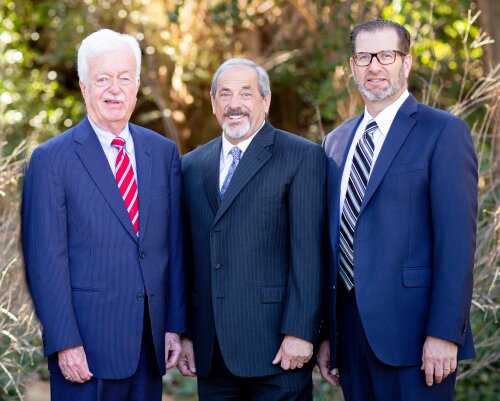Best Arrests & Searches Lawyers in Redlands
Share your needs with us, get contacted by law firms.
Free. Takes 2 min.
List of the best lawyers in Redlands, United States
About Arrests & Searches Law in Redlands, United States
Arrests and searches are central components of the criminal justice process in Redlands, California. Governed by both federal and state law, these procedures are intended to balance community safety with the protection of individual rights. Law enforcement agencies are required to follow specific rules to ensure that constitutional protections, especially those under the Fourth Amendment, are upheld. Anyone who finds themselves involved in an arrest or subject to a search should understand their rights and the local procedures that apply.
Why You May Need a Lawyer
Legal assistance is important in situations involving arrests and searches because your freedom, reputation, and rights may be at stake. Common scenarios where you may benefit from a lawyer's help include:
- Being arrested or detained by the police
- Having your home, car, or belongings searched
- Having property seized by law enforcement
- Facing criminal charges resulting from an arrest
- Challenging the legality of a search or arrest
- Being uncertain about your rights during police encounters
An attorney can help ensure that your rights are protected, challenge evidence obtained unlawfully, and guide you through the complex legal system.
Local Laws Overview
Redlands is located in San Bernardino County, California. As such, arrests and searches are governed by California state law, local ordinances, and federal law. Key legal elements to understand include:
- Probable Cause: Police must have probable cause to make an arrest or conduct a search, except in certain permitted circumstances.
- Search Warrants: In most cases, law enforcement needs a valid warrant to search your property. There are exceptions, such as consent searches, exigent circumstances, or searches incident to a lawful arrest.
- Miranda Rights: If you are arrested and questioned, authorities must advise you of your right to remain silent and your right to an attorney.
- Local Police Practices: Redlands Police Department follows procedures aligned with state law but may have specific policies in place regarding use of force and community policing.
- Evidence Suppression: If a search or arrest is conducted unlawfully, any evidence obtained may be excluded from use in court under the exclusionary rule.
Frequently Asked Questions
What should I do if I am being arrested in Redlands?
Remain calm, do not resist, and clearly state your intention to remain silent and to speak with a lawyer. Ask why you are being arrested and request to see the warrant if applicable, but avoid arguing with the officers.
Can the police search my car without a warrant?
Police can sometimes search your car without a warrant, especially if they have probable cause to believe it contains evidence of a crime, or if you consent to the search. There are also exceptions for officer safety and certain circumstances like impoundment.
Do I have to let police into my home?
Police generally need a search warrant to enter your home unless you give consent, there is an emergency, they are in hot pursuit of a suspect, or another recognized exception applies.
What rights do I have during a search?
You have the right to ask for a warrant and to remain silent. You can refuse consent to a search, but do not physically resist. You also have the right to record police activity, as long as it does not interfere with their duties.
What are my rights if I am searched on the street?
You have the right to remain silent and do not have to consent to a search. If detained, you can ask whether you are free to leave. If searched, you may politely state that you do not consent, but do not resist physically.
Can the police seize my property during a search?
If law enforcement lawfully searches your property and finds items that are evidence of a crime or contraband, they may seize those items.
What happens if my rights were violated during a search or arrest?
If your rights were violated, a lawyer could file a motion to suppress evidence obtained unlawfully. This can have significant impacts on the outcome of your case, and in some instances, charges may be dismissed.
How do I get my property back after it has been seized?
You or your lawyer can file a motion with the court for the return of property, especially if charges are dropped, the property is not contraband, or it was taken unlawfully.
Do the police have to tell me why I am being arrested or searched?
Yes, except in rare circumstances. Police are generally required to inform you of the reason for your arrest and should present a warrant for any searches unless an exception applies.
Can I watch or record the police during an arrest or search?
Yes, as long as you do not interfere with police duties or place anyone’s safety at risk, you have the right to observe and record law enforcement activities in public places.
Additional Resources
If you need more information or support concerning arrests and searches in Redlands, consider reaching out to the following:
- Redlands Police Department - For records or questions about local police procedures
- San Bernardino County Public Defender’s Office - Offers legal assistance for those who cannot afford private counsel
- ACLU of Southern California - Provides educational materials on civil rights and legal advocacy
- California Courts Self-Help Center - Guides for understanding court procedures and navigating the justice system
- Local legal aid organizations - Can provide free or reduced cost legal services
Next Steps
If you or someone you know is facing legal challenges related to arrests or searches in Redlands, it is important to act quickly. Start by gathering all documents related to the incident, such as police reports, warrants, or any communications from law enforcement. Contact a qualified criminal defense attorney who is familiar with Redlands and California law. Your attorney can review your case, advise you of your rights, and help develop a defense strategy. For those who qualify, the public defender’s office can provide representation. Do not discuss your case with anyone other than your lawyer, and remember not to consent to any searches or answer police questions without proper legal counsel.
Lawzana helps you find the best lawyers and law firms in Redlands through a curated and pre-screened list of qualified legal professionals. Our platform offers rankings and detailed profiles of attorneys and law firms, allowing you to compare based on practice areas, including Arrests & Searches, experience, and client feedback.
Each profile includes a description of the firm's areas of practice, client reviews, team members and partners, year of establishment, spoken languages, office locations, contact information, social media presence, and any published articles or resources. Most firms on our platform speak English and are experienced in both local and international legal matters.
Get a quote from top-rated law firms in Redlands, United States — quickly, securely, and without unnecessary hassle.
Disclaimer:
The information provided on this page is for general informational purposes only and does not constitute legal advice. While we strive to ensure the accuracy and relevance of the content, legal information may change over time, and interpretations of the law can vary. You should always consult with a qualified legal professional for advice specific to your situation.
We disclaim all liability for actions taken or not taken based on the content of this page. If you believe any information is incorrect or outdated, please contact us, and we will review and update it where appropriate.










